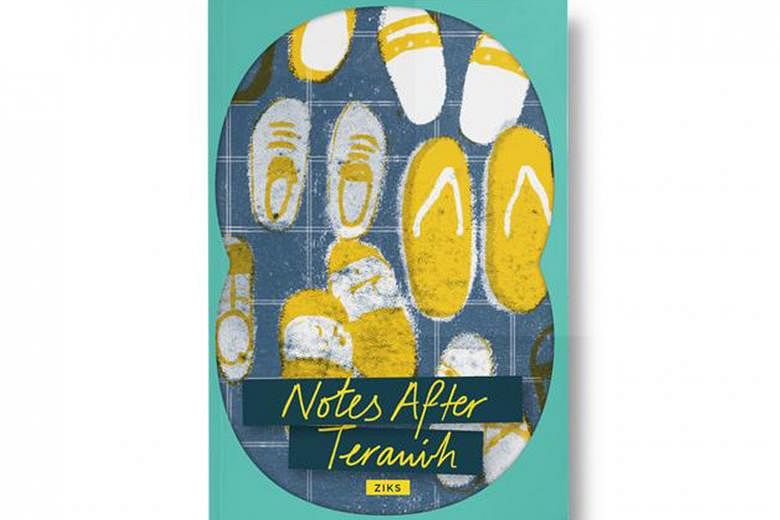From the poems of a young boy who cannot speak to untold stories of rural life in Myanmar, a new series by Singapore publisher Ethos Books is distilling young voices not usually heard in the literary canon into slim reads that it hopes will "knock your socks off in the span of a train ride".
The Orbit series launched this month with three debut books: Giving Alms, three short stories by a Myanmar teacher; A Tiny Space, written by an autistic boy and his family in Singapore; and Notes After Terawih, based on the first-time Ramadan prayer observations of a young Singaporean Muslim.
Ethos associate publisher Ng Kah Gay says: "We wanted to dedicate a series of books to the pockets of time you and I have on the MRT, in waiting areas, during a Causeway jam... Orbit is our way of allowing readers to enter parallel lives beyond our own little orbits."
In Giving Alms, Khin Chan Myae Maung touches on unacknowledged aspects of Burmese village life, such as child slavery, homophobia and depression.
The 25-year-old wanted to write stories about Myanmar that did not have to do with politics. "The military regime is not the only thing that has happened to us. Myanmar people shouldn't be patronised."
The author, who is married and whose family works at a high school in Yangon, grew up in the city, but every year, her mother would take her to the village where her grandmother and great-grandmother lived.
"The person you are now is only because your parents, grandparents and so on survived to a certain degree," she says. "You are a combination of the hopes and dreams of generations."
It took a family to write A Tiny Space, which compiles poems by 11-year-old Fifi Coo, a boy with autism spectrum disorder. To protect his privacy, the book is published under a pseudonym which he chose based on his favourite robot toy and the text on his favourite T-shirt.
Due to his condition, Fifi cannot speak, type or flip the pages of a book. He was not able to communicate with his parents and three older sisters until three years ago, when they introduced him to an alphabet board.
"It was a pretty long journey," says his oldest sister, a researcher in her 20s who, in the book, goes by the name Diamond. "We got a sheet of paper and drew a line down the middle, yes on one side and no on the other. We asked him questions and got him to point to either side. When he got more adept, my mum started him on the alphabet board."
Fifi wrote his first poem in 2015, six lines which took him one or two hours to spell out and which his mother transcribed. Unbeknown to his family, he had been picking up vocabulary through his long silence from newspapers or books they left lying open around the home.
They began posting his poems on Facebook, where they caught Ethos' attention.
The book comprises his poems, the subjects of which range from his frustration at being non-verbal to his joy in swimming and his relationship with God. These are interspersed with conversations with his mother and reflections from the rest of the family, who are Catholic.
"This is an encapsulation of my family's journey," says Diamond. "It's very difficult to explain to my friends - or to anyone at all - the complexities of my family's circumstances and what our experience is really like."
Fifi, she says, receives a lot of judgment from strangers as he will lie down in public, make noises or tap things, drawing odd looks.
She adds that his hopes for the book are for anyone reading his poems to "find heaven in their hearts, find peace and grow closer to God".
Also drawing inspiration from her religion is Hadziqah Mohamed Hafiz Khan, who goes by the pen name Ziks. Notes After Terawih is based on her observations of the ritual night prayer during Ramadan. The 23-year-old began following her father and older brothers to the mosque for terawih in 2015.
She would pray apart from them in the women's section, where, besides learning the intricacies of the ritual, she would see unguarded moments such as children playing, women breastfeeding or girls doing homework. She made notes about her observations in her phone on the way home.
"You can go through so much in the mosque and then just disperse," she says. "It's like it's a secret, but also not. It's very ephemeral. Writing was a way of going through it again."
Hadziqah, who is single, is a recent history graduate from the National University of Singapore. Her father is a Grab driver and her mother works in administration at a secondary school.
She thinks there are many aspects of being Muslim that non-Muslims in Singapore are not aware of. "I think they know we must eat halal and go pray, but they don't know why."
She hopes the book will give some insight into her community as well as evoke a familiar delight in other Muslims.
The Orbit series will continue next year with The Interpreter Of Winds, a magical short-story collection by Singapore writer Fairoz Ahmad.
•The Orbit series ($10 a book before GST) is available from Books Kinokuniya, MPH, selected Times bookstores, Wardah Books, Grassroots Book Room and ethosbooks.com.sg.





